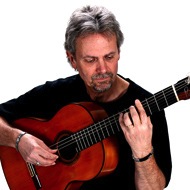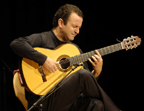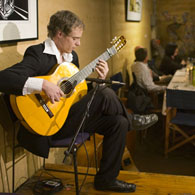Welcome to one of the most active flamenco sites on the Internet. Guests can read most posts but if you want to participate click here to register.
This site is dedicated to the memory of Paco de Lucía, Ron Mitchell, Guy Williams, Linda Elvira, Philip John Lee, Craig Eros, Ben Woods, David Serva and Tom Blackshear who went ahead of us.
We receive 12,200 visitors a month from 200 countries and 1.7 million page impressions a year. To advertise on this site please contact us.
|

|
|
Cultura
|
You are logged in as Guest
|
|
Users viewing this topic: none
|
|
Login  | |
|

   
BarkellWH
Posts: 3462
Joined: Jul. 12 2009
From: Washington, DC

|
 RE: Cultura (in reply to changue) RE: Cultura (in reply to changue)
|
|
|
quote:
Hombre, estoy de acuerdo pero hablar de toritos ya esta prohibido aqui. Parece que formamos una minoria. Yo, por ejemplo, pienso que sin hablar por lo memos un poquitin de castellano no se puede llamarse aficionado.
In the first place, speaking about the corrida is not prohibited here. There are different opinions on the subject, but the topic is not prohibited. In the second place, although I speak Spanish, it is not necessary to do so in order to be a flamenco aficionado, any more than it is necessary to speak Italian in order to appreciate opera, or to speak German in order to appreciate Beethoven and Mozart.
Bill
_____________________________
And the end of the fight is a tombstone white,
With the name of the late deceased,
And the epitaph drear, "A fool lies here,
Who tried to hustle the East."
--Rudyard Kipling
|
|
|
|
REPORT THIS POST AS INAPPROPRIATE |
Date Mar. 15 2015 22:27:25
 |
|

   
BarkellWH
Posts: 3462
Joined: Jul. 12 2009
From: Washington, DC

|
 RE: Cultura (in reply to Thomas) RE: Cultura (in reply to Thomas)
|
|
|
quote:
in my opinion it gets ridiculous when english native speakers post in spanish just to demonstrate their "deep and pure" knowledge of flamenco...not to speak about the obstrusive and constant posting of that corrida thing.
I could not agree with you more, Thomas. I was born and grew up in Arizona; my mother lived in Mexico the first 16 years of her life; I speak Spanish; I have attended bullfights ("corridas"); and one of the books I read at a young age was Ernest Hemingway's "Death in the Afternoon," about the art, practice, and culture of bull-fighting, and it introduced me to the greats: Manolete, Belmonte, and others.
I can honestly state that my love for, and appreciation of, flamenco in all its forms (cante, guitar, and dance) was neither a product of nor influenced by any of my above-cited experiences. Without any of those experiences I would have come to understand and appreciate flamenco every bit as much as I do now. And lest anyone suggest that such experiences have had a subliminal effect on my appreciation of flamenco, I guarantee he would be wrong.
That there are some in Spain who link flamenco with the bull-fight is fine, but that one must understand the link in order to appreciate flamenco is an opinion only. That there are native English speakers who post in Spanish and suggest that one must speak Spanish and understand the bullfight in order to, as you suggest, have a "deep and pure knowledge of flamenco" is, again as you suggest, "ridiculous." Moreover, it reveals an attempt to establish one's self as superior in knowledge to those lesser beings who don't possess the required attributes. It is a form of self-flattery.
Bill
_____________________________
And the end of the fight is a tombstone white,
With the name of the late deceased,
And the epitaph drear, "A fool lies here,
Who tried to hustle the East."
--Rudyard Kipling
|
|
|
|
REPORT THIS POST AS INAPPROPRIATE |
Date Mar. 16 2015 12:03:05
 |
|

   
Escribano
Posts: 6424
Joined: Jul. 6 2003
From: England, living in Italy

|
 RE: Cultura (in reply to Guest) RE: Cultura (in reply to Guest)
|
|
|
If we turn the proposition around a little - the French (amongst many others) love the blues and sing it in their own language. They are not all black, certainly not from the Delta or Chicago and don't speak much English. I assume the Spanish sing the blues in Spanish too. I know the Mexicans do - as well as rock, jazz etc.
In fact, there are localised versions of many genres. Folk, rap, opera, soul, hip hop....
So this begs the question, do we know of anyone singing flamenco in English or any other language except Spanish? Is this impossible, is it sacrilege or could it help the genre become better known in the mainstream?
_____________________________
Foro Flamenco founder and Admin
|
|
|
|
REPORT THIS POST AS INAPPROPRIATE |
Date Mar. 16 2015 15:03:02
 |
|

   
Ricardo
Posts: 15049
Joined: Dec. 14 2004
From: Washington DC

|
 RE: Cultura (in reply to changue) RE: Cultura (in reply to changue)
|
|
|
quote:
ORIGINAL: changue
I am happy to take Escribano's "coterie" point.
Bernd may be surprised to learn that I also have some sympathy with his point of view. What was uppermost in my mind was the excellent link to an interview, posted last week, I think, with Paco interiewed by Maria Zabay. Paco came out with some amazing stuff, for example, saying to the journalist, "you have no idea how difficutlt it is to play the guitar!" I made the assumption, I'm afraid to say, that this post gained little attention because of the language barrier and I thought that was a pity.
Changue
Or perhaps juan didn't notice that it had been posted and discussed in detail long ago? 
This business of spanish speakers having one over on english speakers is true to a degree. But only in the sense it is extremely disrespectful to the culture of flamenco to deny the importance of the language, the food, the bull stuff (in all senses of that term), sure the macho gallo cock fighting thing. But overall this place is for people to share and learn, not strut the big gallo that you have the bigger vocabulary in spanish. Instead of being the cock crowing that folks might not have understood an interview...how about helping people with a translation?
IN the end it is also con mucho razon, those claiming it is MORE important to understand the meaning behind the music of "ay ay ay...." and compas, than the translation of the letra... which in specfic cases might not even have true meaning or relevance to any present generation cantaores, anyway. 
It is not an excuse to NOT TRY to learn the language and go deeper, but some positivity and education vs condescension would better suite the foro in this regard.
It would behoove the administration to actually set up a section for learning spanish, specifically andalu and flamenco terminology where the smarty pant phd's with "spanish 14" under the belt, can go nuts with their vocab whilst helping all the english speakers.
_____________________________
CD's and transcriptions available here:
www.ricardomarlow.com
|
|
|
|
REPORT THIS POST AS INAPPROPRIATE |
Date Mar. 16 2015 15:48:21
 |
|
Guest

|
 RE: Cultura (in reply to aloysius) RE: Cultura (in reply to aloysius)
|
|
|
quote:
I read somewhere about flamenco singing in Japanese but I can't find the source to back that up.
One of the Gendai transcription books i have has a Fandangos with words/melody in Japanese...its out there in print at least
_____________________________
|
|
|
|
REPORT THIS POST AS INAPPROPRIATE |
Date Mar. 17 2015 10:53:36
 |
|

   
bicharraco
Posts: 25
Joined: Mar. 19 2015

|
 RE: Cultura (in reply to Morante) RE: Cultura (in reply to Morante)
|
|
|
Dos apuntes que quiero hacer:
"Se puede entender el Flamenco sin conocer la cultura de la cual procede, del mismo modo que se puede entender a Mozart sin necesidad de ser centro-europeo".
No es lo mismo. La música clásica es un estilo culto y cosmopolíta generado en torno a músicos patrocinados por las casas reales. Ya en el siglo XVIII, los músicos italianos iban a Alemania, los alemanes a Inglaterra e incluso había músicos españoles en Rusia al servicio de los zares.
El flamenco en cambio nace de la endogamia y el aislamiento cultural en una región muy concreta y con fuertes peculiaridades. La música clásica es un lenguajes musical universal, el flamenco es muy local.
Un forero portugués dice que no es necesario entender la cultura taurina para ser flamenco, que en su país hay toros y no flamenco.
Tiene razón, pero no es la cultura taurina en si, sino la forma de vivirla, que es diferente.
Ejemplo: Portugal y Andalucía son católicas, pero la forma de vivir la religiosidad popular es muy diferente en ambos territorios.
El Rocio o La Madrugá a los portugueses les parecen alienígenas, y mira si estamos cerca y tenemos un sustrato cultural común!
|
|
|
|
REPORT THIS POST AS INAPPROPRIATE |
Date Mar. 19 2015 11:12:16
 |
|

   
Morante
Posts: 2222
Joined: Nov. 21 2010

|
 RE: Cultura (in reply to bicharraco) RE: Cultura (in reply to bicharraco)
|
|
|
Hola bicharraco
LLevo 15 años en Cádiz, pero llevo muchos más años visitando España. Soy aficionado de los toros desde los años 70, antes de ser aficionado de flamenco. He recorrido España y me encuentro en mi casa en Cádiz. Mi mujer es de la sierra y no habla inglés. Su familia es mi familia.
En este foro de guitarra, estoy criticado y insultado por mis opiniones. Tu puede sufrir tambien. Pero recuerdo muy bien la primera vez que acompañé a un cantaor, Paco Reyes de Cádiz, por Alegrías. Paco se llama Paco Loco por su forma de vivir y tiene un compás (como dice Jesulín), en dos palabras, im-presionante! Después, Paco me dijó "Seán, tienes compás y sabes tocar, pero lo que ha tocado no es alegrías".
Paco es intimo amigo mío y hablaba de soniquete. Tenía toda la razón. Ahora si, lo tengo!
Donde vives? Pasas alguna vez por La Tacita de Plata?
Morante (de la Puebla) 
|
|
|
|
REPORT THIS POST AS INAPPROPRIATE |
Date Mar. 19 2015 15:20:44
 |
|

  
runner
Posts: 357
Joined: Dec. 5 2008
From: New Jersey USA

|
 RE: Cultura (in reply to Morante) RE: Cultura (in reply to Morante)
|
|
|
|
Having enjoyed flamenco for some 60 years, and believing that I appreciated it as it deserved, I hold with Sr. Martins that one can do so without necessarily being fluent in Spanish, let alone Andalu. Or being interested in the alleged mystique of the bullfight--in fact I just finished reading Gerald Howson's views on Spanish bullfighting, as expressed in The Flamencos of Cadiz Bay, yet Howson is widely held to have been somewhat knowledgeable about flamenco. And it seems to me that the Andalusia of 2015, and the flamenco of 2015, are a far cry from the era of Manuel Torres, Pastora Pavón, and Aurelio, so exactly what is being claimed, pro or contra?
|
|
|
|
REPORT THIS POST AS INAPPROPRIATE |
Date Mar. 19 2015 17:30:18
 |
|
 New Messages New Messages |
 No New Messages No New Messages |
 Hot Topic w/ New Messages Hot Topic w/ New Messages |
 Hot Topic w/o New Messages Hot Topic w/o New Messages |
 Locked w/ New Messages Locked w/ New Messages |
 Locked w/o New Messages Locked w/o New Messages |
|
 Post New Thread
Post New Thread
 Reply to Message
Reply to Message
 Post New Poll
Post New Poll
 Submit Vote
Submit Vote
 Delete My Own Post
Delete My Own Post
 Delete My Own Thread
Delete My Own Thread
 Rate Posts
Rate Posts
|
|
|
Forum Software powered by ASP Playground Advanced Edition 2.0.5
Copyright © 2000 - 2003 ASPPlayground.NET |
0.078125 secs.
|


 Printable Version
Printable Version














 New Messages
New Messages No New Messages
No New Messages Hot Topic w/ New Messages
Hot Topic w/ New Messages Hot Topic w/o New Messages
Hot Topic w/o New Messages Locked w/ New Messages
Locked w/ New Messages Locked w/o New Messages
Locked w/o New Messages Post New Thread
Post New Thread